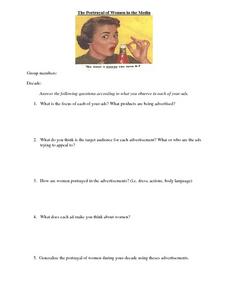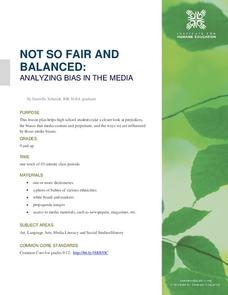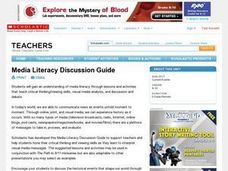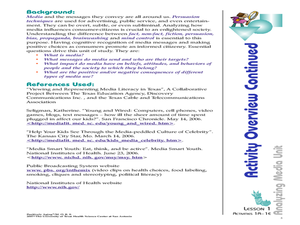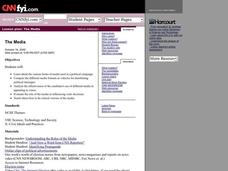Learning for Justice
Beauty is Skin Deep
If you are in need of a activity on tolerance or the impact of media, this plan could be useful. The class begins with a brainstorming session in which they reflect on their own experiences with bias based on appearance. Next, they...
Newseum
E.S.C.A.P.E. Junk News
Fair, balanced, and reputable information? There's an acronym for that! Scholars learn the E.S.C.A.P.E. method for evaluating news sources. Then, pupils work in small groups to read and analyze a news story and discuss the activity to...
Curated OER
Cartoons for the Classroom: Satire or Slander
Encourage your young learners to analyze and think critically about how media portrays people or events. Upper graders analyze a political cartoon depicting President Obama as a Muslim and the First Lady as a revolutionary. Guided by...
News Literacy Project
News Goggles: Lionel Ramos, Oklahoma Watch
Given all the recent criticism of the news media and coverage, it's crucial that young people are given the tools they need to evaluate what they see, hear, and read about current events. A video interview from "News Goggles" introduces...
Southern Poverty Law Center
Analyzing How Words Communicate Bias
Words are powerful ... can your class choose them wisely? Scholars evaluate news articles to discover the concepts of tone, charge, and bias during a media literacy lesson. The resource focuses on recognizing implicit information and...
Facing History and Ourselves
Free Press Makes Democracy Work
A unit study of the importance of a free press in a democracy begins with class members listening to a podcast featuring two journalists, one from a United States public radio station and one from Capetown, South Africa. The lesson,...
Curated OER
The Portrayal of Women in Media
This is an awesome exercise. Learners use this worksheet as they examine an advertisement from a past decade (you need to provide). They answer five questions that aid them in analyzing the ad and the portrayal of women from that time...
Nemours KidsHealth
Media Literacy and Health: Grades 9-12
An essential skill for 21st-century learners is to know how to find reliable sources of information. Two activities help high schoolers learn how to determine the reliability of health-related news from websites, TV, magazines, or...
Curated OER
Grapes of Wrath: Setting up Historical Context
Discuss life in the 1930s in relation to the Dust Bowl and Great Depression, then do a cross-media analysis. Here you'll find background information on film maker John Ford, writer John Steinbeck, and 1930s America. You can compare the...
Media Smarts
The Impact of Gender Role Stereotypes
One of three lessons on gender stereotype, this resource from the Media Awareness Network discusses the violence that is inflicted on men and women as they try to live up to the stereotypes of their gender. The section on women focuses...
Social Media Toolbox
Social Media Survey
Survey says ... social media is here to stay! How do the pupils in your school use social media? Using lesson four from a 16-part series, The Social Media Toolbox, learners study surveys and create their own. The resource includes...
Newseum
Bias Through History: Analyzing Historical Sources
Young journalists use the E.S.C.A.P.E. (evidence, source, context, audience, purpose, and execution) strategy to evaluate historical and contemporary examples of bias in the news. The class then uses the provided discussion questions to...
Media Smarts
Unit Two: Celebrities and World Issues
Develop media smarts by considering the power of celebrity involvement in world issues. A look at the work of such celebrities as Angelina Jolie, Oprah, and Bono prepare learners to develop their own media campaign for a global...
Institute for Humane Education
Not So Fair and Balanced: Analyzing Bias in the Media
Life is not always fair. Who's heard that before? This same concept moves to a larger scale using prejudice and bias. Pupils discuss where prejudice attitudes derive and how they develop throughout life. Reading comprehension...
Media Smarts
Cinema Cops
A study of how public perception is both reflected and influenced by film and television, this instructional activity helps students develop an awareness of audience as well as a critical view of media. Depictions of police in television...
Curated OER
Media Literacy Discussion Guide
Students examine and analyze visual media and its messages critically. They determine whether specific media messages inform, entertain, or persuade and what factors influence the media. Using primary sources, they participate in peer...
Curated OER
Analyzing Media Unit Sequence of Five Activities
Seventh graders define terminology and explore the effects media has on our society and on individuals. In this media evaluation lesson students work cooperatively and solve problems.
Curated OER
Media Bias
Young scholars analyze mass media to analyze media bias. In this media bias lesson plan, students read example situations and definitions about media bias. Young scholars read and discuss how to be aware of media bias.
Curated OER
The Power of One: Convergence in Scholastic Media
Pupils explore the different forms of media utilized by journalism including writing, photography, video, sound and the Internet. In this journalism lesson, students compare and contrast the ways in which information is presented between...
Newseum
'The Press and the Civil Rights Movement' Video Lesson
Scholars watch a video featuring journalists who covered the civil rights movement, then respond to questions on a viewing guide. The video features interviews with participants and original news footage from the 1950s and 1960s. In...
Newseum
Free Press Challenges Through History: Analyzing Historical Sources
The debate over the integrity of stories in media is not new. Young journalists analyze historical sources that reveal freedom of the press controversies and draw parallels to challenges freedom of the press faces today.
Curated OER
The Media
High schoolers identify various forms of media used in a political campaign and compare the different formats as vehicles for distributing political messages. They analyze the effectiveness of candidate's uses of different media.
Curated OER
War and the Media Press Freedom vs. Military Censorship
Students analyze the relationship between war and media. In this media awareness instructional activity, students listen to their instructor present a lecture on freedom of the press and military censorship. Students participate in an...
Facing History and Ourselves
The Power of Images
One picture but a thousand stories. As a part of a case study of how the death of Michael Brown was reported by professional news sources and on social media class members examine the reactions of various groups to a photograph taken by...








